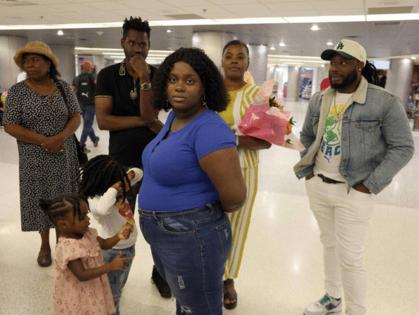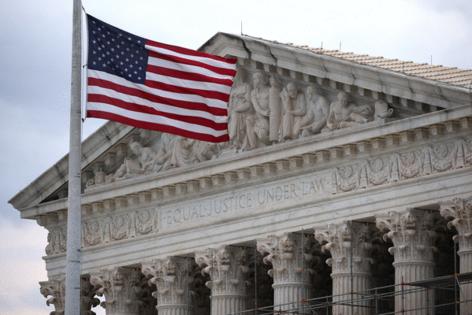Supreme Court lets Trump end parole program for Cubans, Haitians, Venezuelans, Nicaraguans
Published in News & Features
The U.S. Supreme Court on Friday cut off a lifeline to more than 500,000 immigrants from Cuba and three other countries, as the justices overturned a federal judge’s order that halted the Trump administration’s plan to revoke their humanitarian parole.
The court granted the administration’s emergency request to lift the judge’s injunction protecting the paroled immigrants from being deported, while both sides battle in the lower courts over the Department of Homeland Security’s decision to end the parole program adopted during the Biden presidency.
The nine-member court’s brief, unsigned order marked a significant victory for the Trump administration, which has targeted illegal immigration as its number one priority.
It also dealt a substantial setback for the paroled immigrants from Cuba, Haiti, Nicaragua and Venezuela who have come under the CHNV program, named for the initials of the nationalities affected. As a class action, they have sued the Department of Homeland Security in Boston federal court, which led to the Supreme Court’s interim ruling in favor of the government on Friday.
The high court’s order said Justices Ketanji Brown Jackson and Sonia Sotomayor dissented from the decision. In her dissent, Jackson wrote that “the Court has plainly botched (the) assessment” of whether the Trump administration would suffer “irreparable harm” as it claims sole authority to terminate the humanitarian parole program “en masse.”
“It requires next to nothing from the Government with respect to irreparable harm,” wrote Jackson, who was joined by Sotomayor. “And it undervalues the devastating consequences of allowing the Government to precipitously upend the lives and livelihoods of nearly a half million noncitizens while their legal claims are pending.”
‘How are we supposed to go back?’
The Supreme Court ruling left an elderly Venezuelan couple living in Miami reeling.
Orlando Valecillos arrived in the U.S. with his wife in August under the CHNV program to reunite with their daughter. Valecillos, 71, is scheduled to undergo prostate surgery next month.
“I hope I won’t be deported before my surgery,” Valecillos, who lives in Homestead, told the Miami Herald. “I’ve had serious prostate issues, and treatment only began after we arrived in the U.S.”
Instead of spending their golden years in peace, Valecillos and his wife have endured the ongoing humanitarian crisis in Venezuela, which forced them to emigrate twice —first to Chile, where they lived for several years, and then to the United States, where they finally reunited with their only daughter after a long separation.
The couple entered the U.S. under the humanitarian parole program, which initially granted them two years of protection through August 2026. But less than a year after arriving, they received a notice from the Department of Homeland Security that their parole had been terminated, once again throwing their future into uncertainty.
They have since applied for political asylum. Valecillos says he remains hopeful their application will be approved. Their daughter is a green-card holder, and the family hopes that once she becomes a U.S. citizen, she will be able to petition for her parents to adjust their immigration status.
“We had hoped the election in Venezuela would help fix things. Instead, everything is worse,” Valecillos said, his voice trembling. “How are we supposed to go back? If we can’t stay here, where are we supposed to go? There’s so much uncertainty.”
‘Shameful betrayal’
Immigration advocates and human rights organizations blasted the court decision Friday
“The Supreme Court’s ruling sets a dangerous precedent by allowing the Trump administration to dismantle longstanding humanitarian protections for people fleeing persecution and abuse in countries in crisis. These programs offered safety, dignity, and the chance to rebuild lives,” said Ida Sawyer, Crisis, Conflict and Arms Director at Human Rights Watch. “This marks a shameful betrayal of US commitments under international law and human rights norms. The US should be expanding protections, not closing the door.”
The Department of Homeland Security issued a statement hours after the ruling calling it “a victory for the American people.”
“The Biden Administration lied to America. They allowed more than half a million poorly vetted aliens from Cuba, Haiti, Nicaragua, and Venezuela and their immediate family members to enter the United States through these disastrous parole programs,” the statement from Homeland Security Assistant Secretary Tricia McLaughlin said. “Ending the CHNV parole programs, as well as the paroles of those who exploited it, will be a necessary return to common-sense policies, a return to public safety, and a return to America First.”
The high court ruling was not unlike the justices’ decision on May 19 that allowed the administration to revoke deportation protections and work permits for hundreds of thousands of Venezuelans living in Florida and other states with Temporary Protected Status granted during the Biden presidency.
In early May, the Trump administration asked the Supreme Court to allow immigration officials to end the temporary humanitarian parole program that was adopted by the Biden administration to alleviate a migrant crisis at the U.S.-Mexico border.
In an emergency filing, Solicitor General John Sauer requested that the court stay the federal judge’s order stopping the Department of Homeland Security from revoking the parole status.
The program, introduced by former Homeland Security Secretary Alejandro Mayorkas, allowed migrants from the four countries to come to the United States for up to two years as part of an effort to reduce unlawful border crossings.
In March, his successor, Kristi Noem, terminated the temporary parole program, citing national security risks, mounting immigration backlogs and evolving foreign policy concerns.
But after the case was filed in Boston federal court, U.S. District Judge Indira Talwani ruled that Homeland Security could not end the program across the board. Instead, she ordered the agency to conduct individual case reviews for all 532,000 migrants before revoking their parole. The group consists of 210,000 Haitians, 120,000 Venezuelans, 110,000 Cubans and 90,000 Nicaraguans.
‘One-way ratchet’
Talwani ruled the Trump administration misinterpreted immigration law by viewing paroled migrants as illegal border crossers rather than individuals granted legal entry into the United States.
On May 28, the judge modified her earlier decision certifying the paroled group for a class action because of their similar immigration status. She also put on hold the administration’s suspension of paroled immigrants’ applications for certain benefits, such as asylum — an issue she had not addressed in her initial decision in April.
“If their parole status is allowed to lapse, (the paroled immigrants) will be faced with two unfavorable options: continue following the law and leave the country on their own, or await removal proceedings,” Talwani wrote in April. “If (they) leave the country on their own, they will face dangers in their native countries.”
The First Circuit Court of Appeals also denied the administration’s request to pause her original ruling, prompting the appeal to the Supreme Court.
The Trump administration argued that Talwani’s decision exceeded the court’s authority and interfered with powers Congress granted to Homeland Security. Sauer noted that federal law gives the department’s secretary broad discretion over parole decisions—including the ability to revoke them—and limits judicial review of such actions.
Sauer criticized what he called a “one-way ratchet,” saying Mayorkas was allowed to approve parole for large groups but is now requiring Noem to revoke it one case at a time. He warned that this could overwhelm the already overburdened immigration system.
“The district court’s indefinite halt of parole revocation irreparably harms the government,” Sauer wrote. “The court’s order blocks the Executive Branch from exercising its discretionary authority over a key aspect of the Nation’s immigration and foreign policy and thwarts Congress’s express vesting of that decision in the Secretary, not courts.”
The administration emphasized that migrants knew their parole was temporary and could be revoked at any time. It warned that the court’s order could disrupt immigration enforcement and diplomatic efforts.
President Joe Biden established the CHNV “humanitarian parole” program in January 2023 in an effort to stem the flow of undocumented immigration to the U.S.-Mexico border. It allowed people from the four countries to come to the United States for two years if they had a sponsor in the country, passed a background check and bought a plane ticket. The program allowed a maximum of 30,000 people a month to come to the United States. More than 500,000 people came under the program.
The attorneys representing the four groups argued that ending the CHNV program is not only legally flawed but also inhumane, as it effectively cuts off pathways to asylum and permanent residency for thousands of vulnerable individuals.
Freezing the status quo in place prevented immigrants from Cuba, Haiti, Nicaragua and Venezuela from imminent termination of their parole status by the Trump administration. Still, the paroled immigrants, depending on when they arrived in the United States, face a two-year deadline that affects each one differently — it could fall next month, this summer or even in 2026 for those who arrived as recently as last December.
Immigration lawyers highlighted challenges for paroled immigrants seeking asylum, TPS, or green cards. Advocates have hoped those with pending applications can remain in the U.S. even after their parole expires, a courtesy the Trump administration would likely not extend, arguing its termination order was not subject to court review.
_______
(Miami Herald staff writers Jacqueline Charles and Syra Ortiz Blanes contributed to this story.)
_______
©2025 Miami Herald. Visit at miamiherald.com. Distributed by Tribune Content Agency, LLC.










Comments